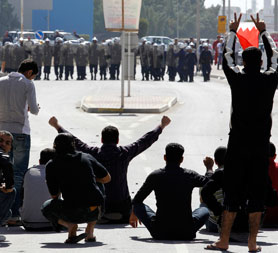Bahrain ‘dialogue’ fails to sway opposition
The King of Bahrain hails a ‘national dialogue’ as a way to reconcile a country torn by sectarian divisions – but its largest opposition party has not yet confirmed whether it will take part.

The dialogue, set to begin on Saturday, is part of Bahrain’s efforts to restore its image after a violent crackdown on demonstrations led primarily by the kingdom’s Shia majority in February and March.
“We have many reservations,” Sayyid Haji Al Mousavi, a member of the Al-Wefaq party, Bahrain’s main Shia opposition party told Channel 4 News.
“For one, the parliament speaker, Khalifa bin Ahmed al-Dhahrani, will be chairing the dialogue. How can he run this dialogue if he’s from the government? He will keep everything under the authority’s favour. We are not optimistic there will be change.”
Al-Wefaq will announce its decision on whether or not it will participate at a press conference on Friday.
In an earlier statement, the government said the national dialogue chairmanship “will consider salary increases, raising standards of living, retirement pensions, private sector workers’ salaries, youth support, future economic plans… and media and press legislations”.
But activists remain sceptical. “This is not a dialogue, this is the king trying to put up a show,” said Zainab Al-Khawaja, an activist who has publicly protested against treatment of her activist father. “He’s not even trying to make it seem fair.”
Read more from Channel 4 News's coverage of events in Bahrain
Human rights probe
Bahrain also announced an independent fact-finding mission made up of human rights and legal experts on Thursday, who will investigate charges of human rights abuses, including torture, during the government’s crackdowns.
We are not optimistic there will be change. Sayyid Haji Al Mousavi, Al-Wefaq party member
King Hamad bin Isa Al Khalifa, who said he had consulted with the UN High Commissioner for Human Rights on establishing the committee, said he was committed to reform and respect for human rights, but blamed protesters for pushing the country into a “state of chaos” with street marches earlier in the year.
The King appointed Mahmoud Cherif Bassiouni, a law professor and UN expert on war crimes, to lead the commission. Bassiouni has vowed to carry out a fair, methodical and transparent investigation.
“There are regulations against torture, regardless of what the person tortured has done,” he said.
Shia denials
At least two dozen people were killed during the clashes earlier this year, including protesters and security personnel, and hundreds were arrested. The government says the unrest was mostly the work of Shia protesters pushing a sectarian agenda, backed by Shia Iran.
Shias deny the accusations and say they were protesting against systematic discrimination that limits their access to jobs and social services.
One key question is whether the government will act on the committee’s recommendations.
The government has said the commission’s final report and recommendations, due in October, will be published in full.
The commission includes Canadian judge and former ICC president Philippe Kirsch, British human rights lawyer Nigel Rodley, Iranian lawyer Mahnoush Arsanjani and Kuwaiti Islamic law expert Badria al-Awadhi.
One key question is whether the government will act on the committee’s recommendations. After a period of repression between 1994 and 2000 that drew fierce criticism from human rights groups, the current king ascended the throne and introduced reforms – although there were no subsequent reparations or prosecution of those accused of abetting torture.





